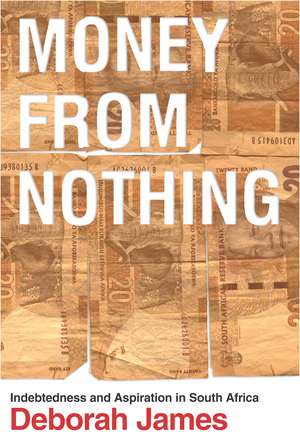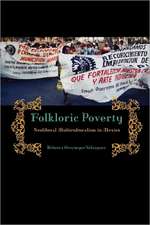Money from Nothing: Indebtedness and Aspiration in South Africa
Autor Deborah Jamesen Limba Engleză Paperback – 18 noi 2014
Money from Nothing explores the dynamics surrounding South Africa's national project of financial inclusion—dubbed "banking the unbanked"—which aimed to extend credit to black South Africans as a critical aspect of broad-based economic enfranchisement.
Through rich and captivating accounts, Deborah James reveals the varied ways in which middle- and working-class South Africans' access to credit is intimately bound up with identity, status-making, and aspirations of upward mobility. She draws out the deeply precarious nature of both the aspirations and the economic relations of debt which sustain her subjects, revealing the shadowy side of indebtedness and its potential to produce new forms of oppression and disenfranchisement in place of older ones. Money from Nothing uniquely captures the lived experience of indebtedness for those many millions who attempt to improve their positions (or merely sustain existing livelihoods) in emerging economies.
Through rich and captivating accounts, Deborah James reveals the varied ways in which middle- and working-class South Africans' access to credit is intimately bound up with identity, status-making, and aspirations of upward mobility. She draws out the deeply precarious nature of both the aspirations and the economic relations of debt which sustain her subjects, revealing the shadowy side of indebtedness and its potential to produce new forms of oppression and disenfranchisement in place of older ones. Money from Nothing uniquely captures the lived experience of indebtedness for those many millions who attempt to improve their positions (or merely sustain existing livelihoods) in emerging economies.
| Toate formatele și edițiile | Preț | Express |
|---|---|---|
| Paperback (1) | 196.89 lei 22-36 zile | |
| Stanford University Press – 18 noi 2014 | 196.89 lei 22-36 zile | |
| Hardback (1) | 703.55 lei 43-57 zile | |
| Stanford University Press – 18 noi 2014 | 703.55 lei 43-57 zile |
Preț: 196.89 lei
Nou
Puncte Express: 295
Preț estimativ în valută:
37.68€ • 39.44$ • 31.36£
37.68€ • 39.44$ • 31.36£
Carte disponibilă
Livrare economică 10-24 martie
Preluare comenzi: 021 569.72.76
Specificații
ISBN-13: 9780804792677
ISBN-10: 0804792674
Pagini: 304
Dimensiuni: 152 x 229 x 23 mm
Greutate: 0.41 kg
Editura: Stanford University Press
Colecția Stanford University Press
ISBN-10: 0804792674
Pagini: 304
Dimensiuni: 152 x 229 x 23 mm
Greutate: 0.41 kg
Editura: Stanford University Press
Colecția Stanford University Press
Recenzii
"Credit, and its flip side, debt, emerges as a fundamental lens through which to view the workings of both social mobility and economic disenfranchisement, precariously inter-twined in the New South Africa. James makes complex theory accessible, combining it with page-turning ethnography—utterly captivating!" —Dinah Rajak, Senior Lecturer in Anthropology, University of Sussex and author of In Good Company: An Anatomy of Corporate Social Responsibility (Stanford University Press 2011)
"Partly perhaps because of its history, Africa (southern Africa in particular) has been a fertile region for work by social anthropologists on economic tops. This book is an especially good exemplar . . .The [book] is a highly readable account of the formal and informal institutions of credit and indebtedness - as well as the networks of obligation, reciprocity, and rejection - enlivened throughout by vignettes and analysis derived from her ethnographic fieldwork . . . Highly Recommended."—J.H. Cobbe, CHOICE
"[A] new book by Deborah James [...] puts South Africa's debt industry under a microscope . . . James is an an anthropologist at the London School of Economics, so her book, Money From Nothing — Indebtedness and Aspirations in South Africa, present a more nuanced perspective than we're accustomed to getting from bank-employed economists or trade unionists."—Ann Crotty, The Times
"South Africa, the most unequal society in the world, has recently launched a consumer credit boom. Property rights have been strengthened, but debtors lack the legal protection that is normal elsewhere. Deborah James's much needed ethnography reveals what it feels like to be on the receiving end of this boom for the banks."—Keith Hart, London School of Economics
"Money from Nothing offers the most comprehensive, multi-angled study that we have of new initiatives in credit and debt in a poor population. It will be a key source for all who concern themselves with the debt nexus, as lived."—Jane I. Guyer, Johns Hopkins University
"Money from Nothing offers the most comprehensive, multi-angled study that we have of new initiatives in credit and debt in a poor population. It will be a key source for all who concern themselves with the debt nexus, as lived."—Jane I. Guyer, Johns Hopkins University
Notă biografică
Deborah James is Professor of Anthropology at the London School of Economics. Her previous books include Gaining Ground? "Rights" and "Property" in South African Land Reform (2007) and Songs of the Women Migrants (1999). She has written for the Mail and Guardian and has appeared in Laurie Taylor's Thinking Allowed, on the BBC.
Descriere
This book explores South Africa's "crisis" of consumer indebtedness, set against the longer history of exploitation of black people by the forces of capitalism, and shows the complex ways those forces currently manifest themselves in a social order where neoliberal means serve to ensure the ever wider spread of redistribution.
Alongside the notorious racial segregation and denial of rights, this book explores the longer history of exploitation of South African black people by the forces of capitalism in the form of consumer indebtedness, and the complex ways in which those forces currently manifest themselves in a neoliberal social order.
Alongside the notorious racial segregation and denial of rights, this book explores the longer history of exploitation of South African black people by the forces of capitalism in the form of consumer indebtedness, and the complex ways in which those forces currently manifest themselves in a neoliberal social order.












